- News
- Reviews
- Bikes
- Accessories
- Accessories - misc
- Computer mounts
- Bags
- Bar ends
- Bike bags & cases
- Bottle cages
- Bottles
- Cameras
- Car racks
- Child seats
- Computers
- Glasses
- GPS units
- Helmets
- Lights - front
- Lights - rear
- Lights - sets
- Locks
- Mirrors
- Mudguards
- Racks
- Pumps & CO2 inflators
- Puncture kits
- Reflectives
- Smart watches
- Stands and racks
- Trailers
- Clothing
- Components
- Bar tape & grips
- Bottom brackets
- Brake & gear cables
- Brake & STI levers
- Brake pads & spares
- Brakes
- Cassettes & freewheels
- Chains
- Chainsets & chainrings
- Derailleurs - front
- Derailleurs - rear
- Forks
- Gear levers & shifters
- Groupsets
- Handlebars & extensions
- Headsets
- Hubs
- Inner tubes
- Pedals
- Quick releases & skewers
- Saddles
- Seatposts
- Stems
- Wheels
- Tyres
- Health, fitness and nutrition
- Tools and workshop
- Miscellaneous
- Tubeless valves
- Buyers Guides
- Features
- Forum
- Recommends
- Podcast
OPINION
Why I risk prison to make our roads safer and save our planet – a campaigner tells his story
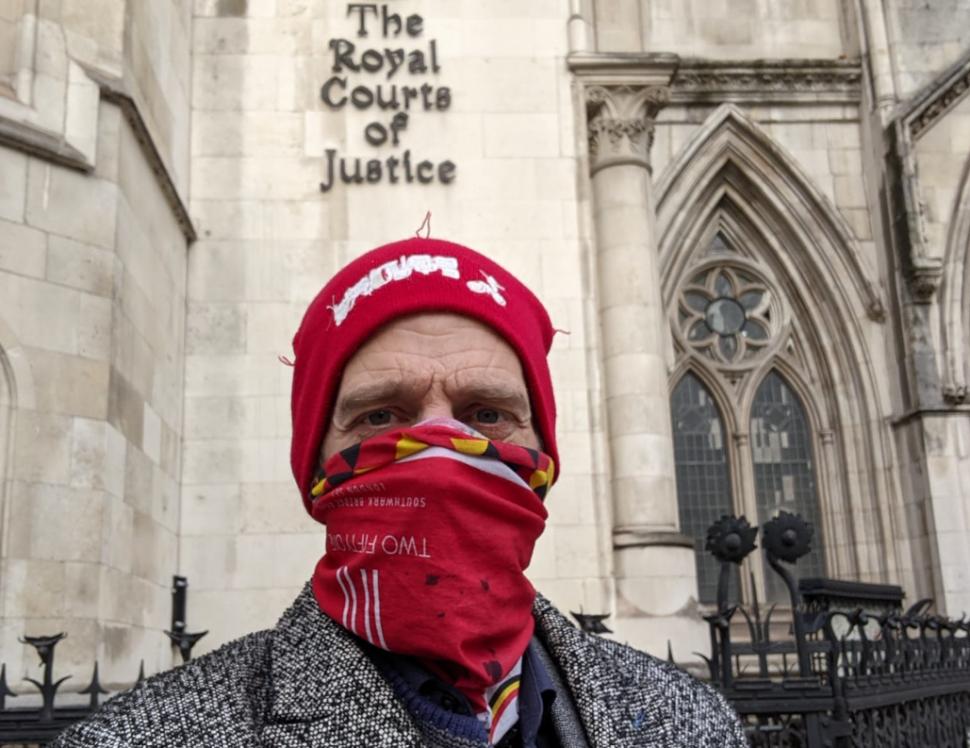 Caspar Hughes
Caspar HughesOne-time London bike courier Caspar Hughes, who went on to found and run the static track bike racing events company Rollapaluza, has diverted his energies in the past few years to campaigning for safer roads for cyclists and, more recently, trying to avert the looming climate catastrophe.
Here, he shares with road.cc readers his journey from courier to campaigner – as well as explaining why he is willing to risk jail to fight for what he believes in. Over to Caspar ...
Earlier this week, I experienced my first visit to the Royal Courts of Justice. It’s an amazing building and very different to my only other experience of courts in the UK, St Albans Magistrates’ Court. I was there to challenge three injunctions from National Highways and Transport for London (TfL) against Insulate Britain).
The injunctions in question include a long list of roads in and around London on which persons named or unknown could be arrested if they take part in any action that slows or disrupts traffic.
So why was I – someone who has been arrested four times in the last three years whilst taking part in peaceful direct action for Extinction Rebellion – in court challenging TfL’s injunctions against Insulate Britain?
It started in 2015 when I was running a cycling events company called Rollapaluza, a period on which I look back with fondness.
I remember reading an article on BikeBiz written by Carlton Reid questioning why so few people in the cycling industry were involved in campaigning. I wondered why I wasn't more involved personally.
A few days later I stumbled upon a bunch of cyclists doing something at a junction on Denmark Hill. I stopped and hung around for a few minutes, asked a few questions but didn’t really learn much. I later realised it was a Die-In for Esther Hartsilver who had been killed at the terrible junction of Orpheus Street and Denmark Hill – a junction that hasn’t changed much since, and six years later it’s still as dangerous as it was back then.
I started to read up on the campaigning landscape and quickly realised how much of a role active travel had to play in making certain roads in cities safer, less polluted and less congested, alongside improving people's physical and mental health.
I also learned that since 2015, transport has been the largest greenhouse gas-emitting sector in the UK.
One of the fundamental ways to reduce emissions from this sector is to prioritise active travel and public transport over private car use. It is currently socially acceptable to take 1.5 tonnes of metal with you to the shops to buy a pint of milk, loaf of bread and a newspaper. This has to change – and change fast – if we are to avoid civilisational collapse in the coming decades.
The comparison between most UK and Dutch cities in particular was amazing.
Two per cent of children in the UK cycle to school; 50 per cent of Dutch kids cycle the same journey, developing a routine of activity from an early age.
This habit makes them far healthier than we are, despite the Dutch love of covering anything in batter, deep frying it and sticking it in a vending machine so it’s available 24/7.
A third of all journeys are cycled in the Netherlands, including by people cycle deep into retirement. Over here, it’s still hovering around 2 per cent. Outside pockets of London, only Cambridge comes anywhere near Dutch levels of cycling.
I was living in Tower Hamlets when I learned of Ying Tao’s death and the Die-Ins that followed.
I turned up to the first one, organised by Stop Killing Cyclists, and I was taken aback by two things.
The first was that there appeared to be hundreds of people hanging around long before it was meant to start – it was far, far bigger than what I had seen in Denmark Hill.
The second was that people were fretting because the PA they’d hired didn’t work, I noticed that the problem was a missing lead to connect the mic to the PA, I knew there was a shop that sold the missing lead locally and one of the volunteers kindly took instructions about what lead to buy and where to go, whilst I started setting everything else up.
That was the first direct action with which I got involved. Since then I’ve helped a small team of volunteers set up and run far too many Die-Ins with Stop Killing Cyclists, and I’ve regularly been brought to tears speaking to people who’ve lost family members because drivers killed them.
We also organised and ran two national funerals for victims of road violence, where horse drawn carriages carried coffins symbolising people who’ve been killed by pollution, emissions, obesity, crashes and disease brought on by inactivity.
I successfully managed to arrange and help negotiate support from Cycling UK, London Cycling Campaign and Extinction Rebellion who generously supported some of our actions that were increasing in their disruptive elements.
In 2016 I moved out of London, back to the West Country. Whilst I was still active with Stop Killing Cyclist my focus turned to my new adopted city of Exeter. I was fortunate in that there was a Cycling Campaign starting in the city in the same year I moved in.
Exeter is tiny – half the population of the central London borough of Tower Hamlets, but spread over twice the area.
Thankfully there are far fewer deaths despite cycled journeys being three times the national average at 6 per cent. But they do happen, about one person walking or cycling is killed in Exeter every other year.
It took me five years to persuade Exeter Cycling Campaign, who are naturally far more conservative (with a small ‘c’) than London’s Stop Killing Cyclists to organise a Die-In.
I did so by explaining that whilst Die-Ins are a form of disruptive direct action, first and foremost they are a ceremony; we pause the hustle and bustle of daily life with a poignant couple of minutes’ silence, whilst we lie down in the road, often where the fatal crash happened, to mark the passing of someone who has been killed by a driver.
Sometimes it’s a teacher, sometimes a nurse, a doctor, a cleaner, a cycle courier … it doesn't matter what they did for a living, they were killed whilst cycling on the roads where it should be safe for us to travel.
I’d estimate that around 90 per cent of these ceremonies were attended by family members of the victims, and often they will speak at these commemorations of their loved ones’ passing … if you’ve ever been to a vigil where that has happened, you’ll know how quickly your eyes can well up listening to them.
Which brings me back to the top. The injunctions that National Highways and TfL brought against Insulate Britain were written in a way that could have included many of the people I’ve written about above. Until our challenge, these injunctions could’ve been interpreted in a way that these people could have faced unlimited fines and up to two years in prison.
I know that the direct action we’ve taken has been effective. Boris Johnson’s mayoral team said that the Stop Killing Cyclists direct action did two things – it generated the conversation amongst the general public in London that protected cycling was a solution to the number of people being killed whilst cycling, and it lit a fire under their administration to deliver the start of the protected cycling network we are seeing emerge in London.
In Exeter, our initial peaceful direct action led to a meeting with the Police Crime Commissioner, despite her initial reaction being to tell us we were lucky our vigil wasn’t disrupted by anarchists. The Exeter Cycling Campaign regularly meets local government and have recently met with the local Police Service lead for road traffic collisions.
Peaceful direct action works.
It’s a necessary part of a functioning and healthy democracy, which is why it is important these injunctions were – and will continue to be – challenged.
More Opinion
Latest Comments
- the little onion 56 min 15 sec ago
i dunno. EPO is pretty cheap these days
- Rendel Harris 4 hours 43 min ago
No idea if Cancellara was using a motor or not, I hope not as I greatly enjoyed him as a rider, but the tech was certainly available, I can...
- wtjs 6 hours 21 min ago
Fair enough:...
- SecretSam 7 hours 32 min ago
Usual ugly Pinarello, bumps and curves where they aren't needed. And, according to Mapdec, not well built.
- Rome73 9 hours 39 min ago
That's not strictly true - Reform will legalise immigrant baiting, trans bashing and tar and feathering of anyone woke. Loads of fun for all the...
- Rendel Harris 9 hours 26 min ago
What's a "legitimate cyclist" please? Someone who doesn't conform to your arbitrary norms? At the age of 56 I admit that you have 13 years more...
- mattw 1 day 15 min ago
This risks turning me into a hanger and flogger....
- Spangly Shiny 1 day 5 hours ago
I had the pleasure of owning two of the featured builders here, in my history. When I joined the Army in 1971, I took with me my curly Hetchins:...
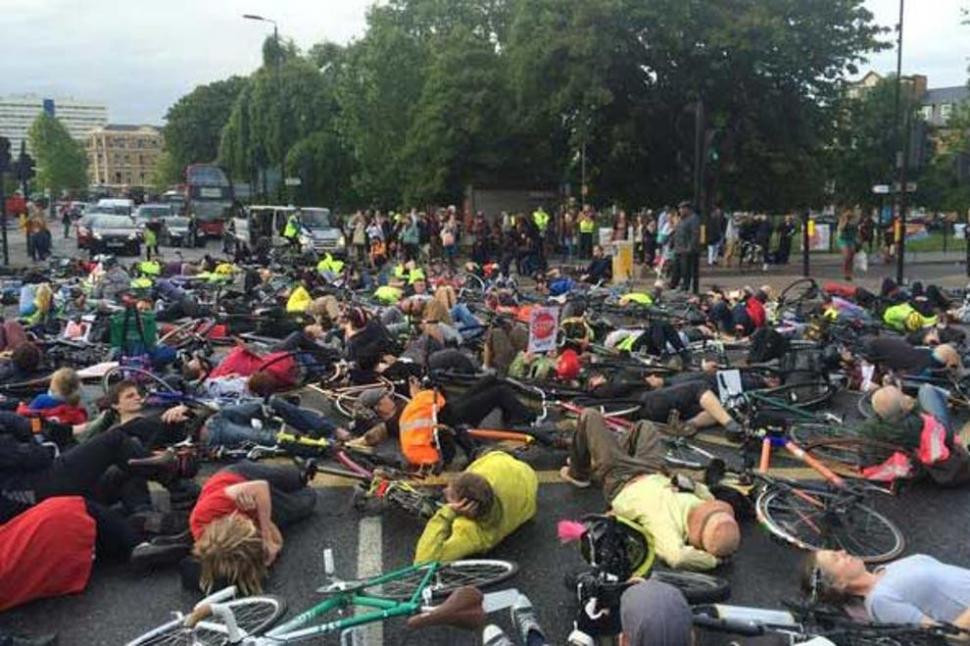

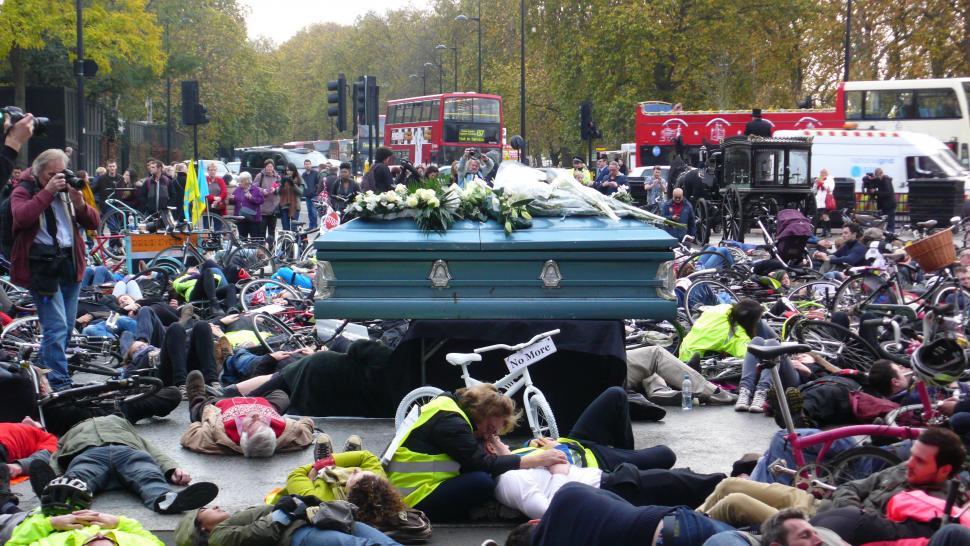
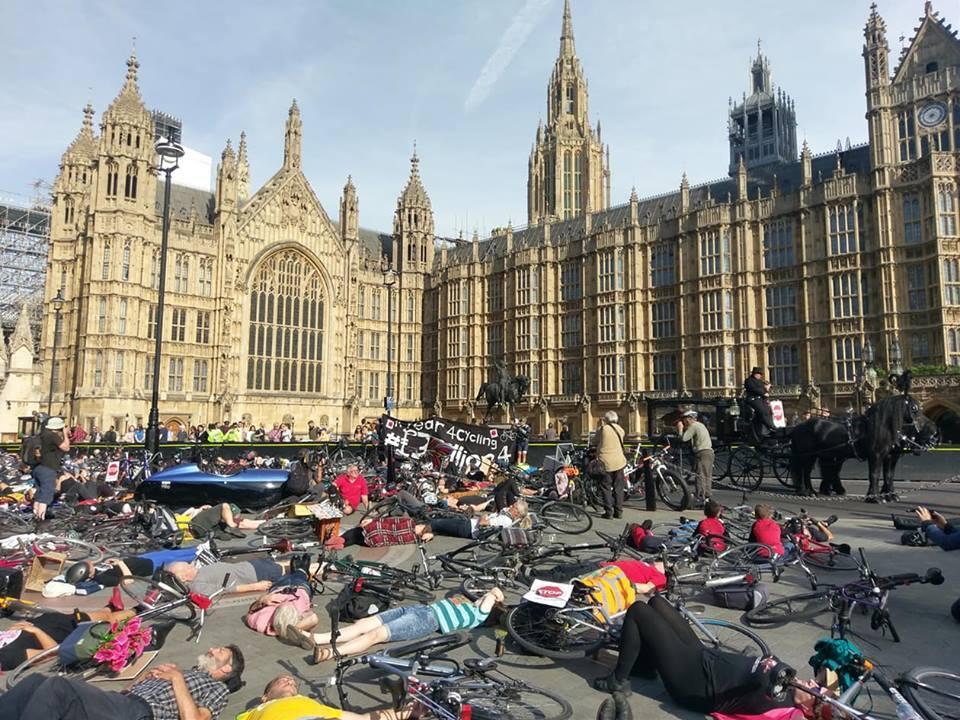
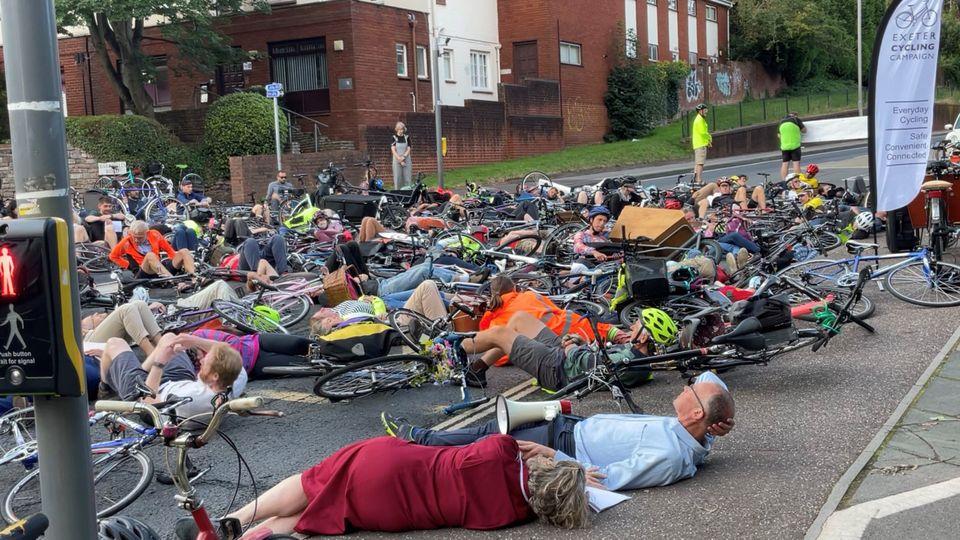
Add new comment
53 comments
You'll have to be more specific, because I don't see any methodology quoted behind the link. All I see is a table of results, broken out by some fairly basic characteristics (age, gender, broad social class, etc.). It doesn't say anything about how those respondents were acquired and how they mitigated for selection bias. it doesn't say how they cross-segment. It doesn't say anything about controlling for or recognising other relevant factors. And as for a 'decent number of people', we clearly have different ideas about that - there were, for example, barely a hundred 18-24 year olds.
The evidence I'm basing my opinion on is a collection of things - documented evidence of public reaction to the protests; media reporting of the same, public discussion in various forums relating to them; personal converstaions, etc. - all pretty weak and anecdotal. And now this survey, which I also judge to be weak and uninformative in this regard. Which is why the current opinion that I've formed is that we can't make any reasonable claims to knowledge on the matter at the moment.
If we want to guage public opinion on any topic what options are available to us?
To be 100% sure we'd got it right we could ask every single person but that is unrealistic (even the census only achieves a 97% response).
The best evidence we can possibly gather is therefore a weighted sample. The larger the sample the more reliable it is likely to be.
In this case 1635 people were asked by a well established polling company. The questions were then repeated several weeks later to another 1667 people. The results were even more pronounced, support fell even further and opposition increased.
We've got 2 weighted samples of 1600+ people conducted on 2 separate occasions both showing that the protests are alienating people and damaging the cause for climate action.
Against that we've got things you read in the paper or heard down the pub.
To state that the two types of evidence are equivalent is patently absurd.
Objectively the Yougov surveys are, by some distance, the best quality evidence available.
The methodology was available through the drop down menu:
https://yougov.co.uk/about/panel-methodology/
The second research is here:
https://yougov.co.uk/topics/politics/articles-reports/2021/10/08/three-w...
If you compare activist protests with e.g. the suffragette movement, then you'll find that they face lots of opposition and people decrying "you're protesting in the wrong way". Also, the suffragette movement gave women zero votes until they'd won, so it's meaningless to look at interim results. Ultimately, history is going to decide if they were justified or not - plenty of protest movements do fizzle out before achieving their aims, but there's been some powerful changes to the world from successful disruptive protests.
The suffragette movement gradually increased in size and influence until it achieved its aims.
I'm sceptical that a tactic which produces entirely negative results will result in a similar trajectory.
If love to see better insulation across the UK, spent a very geeky few hours researching enerPHit just yesterday. If they can't convince the already convinced they're clearly failing spectacularly.
Time to stop before they do any more harm.
The suffragettes were pretty hardcore in their tactics (e.g. https://en.wikipedia.org/wiki/Suffragette_bombing_and_arson_campaign) and faced such extreme opposition that they learnt Suffrajitsu from Edith Garrud to fight back against the police. They tended to not f*ck around.
They were waging a terrorist campaign. The arson attacked houses of politicians but also some other members of the public (justified because houses were owned by men). Rather more violent but equally "at the public". Not only that but they defaced the coinage, damaged valuable property and art and sabotaged sporting events. None of which was viewed with much sympathy (and some still isn't).
Question is in the current context - what was their contribution to the changes which - eventually - followed? The militant Suffragettes were just one part of the movement for women's representation. There was the "they're damaging our cause" accusations at the time also - still debated. Then there's the First World War which lead to significant societal changes also.
An interesting if slightly tangential historical fact is that Suffragettes were trained to knock off policemen's helmets, the reason beng that the helmet was an expensive item and in those days if a peeler lost his titfer he had to pay for the replacement himself, so if you could knock his helmet off he'd most likely lay off trying to arrest you in order to recover it.
Useful Idiots is spot on unfortunately.
May as well be sponsored by Gazprom.
I'd agree they've missed the mark with much of this. I'm not even sure they've done well in "raising the issue in national consciousness". For what it's worth I would suggest they've been less disruptive and antagonistic than XR.
However you ask about positive changes and although not the kind you're looking for you're forgetting one. Have they rallied support / encouraged anyone / "ossified the position" amongst people *in their camp*? For example I wouldn't take much from a "unite the right" rally nor would that change the nation. It is certainly popular amongst that demographic and may convince some "hangers-on" that this group is effective / inspiring / something they want to join or be more active in. Groups have various smaller goals as well as the stated "aim" e.g. continuing to keep the members turning out as well as inspiring others allied to the main cause.
Whether IB is right is irrelevant. We spend an inordinate amount of time criticising people who take action, with probably less spotlight on those causing the damage - eg the rest of us.
Yeah I get what you are saying, but I do not agree that innocent people going about their jobs should be held up whilst people who don't seem to have a job stick themselves to the road. They will not get much sympathy, and certainly don't get any sympathy from myself. Strange how now the cold winter weather is upon us, they're not gluing themselves to the M25. Are they fair weather protestors?
Surely people are only getting held up if they are motorists. Presumably nobody forced them into their cars.
People on buses (for example) were likely delayed too. However, I think it would be pretty much impossible for Insulate Britain to cause any significant amount of disruption - if the roads weren't already at or near breaking point. Just look at their main target - the M25, I'd be surprised if they changed average speeds by more than 0.01%
Yeah but road tax
Innocent people are held up all the time.
I had to stop to avoid somebody coming out of a shop the other day - they just stepped out in front of me and I had to stop because I would have walked into the path of other people walking the other way. And that was just people who were too ignorant to look before they stepped out of a shop.
And don't get me started on people who carry on walking side by side, expecting everybody around them to go into single file so heir conversation carries on.
I've been held up by people who discourteously put themselves in a fatal collision on the motorway.
I've been delayed because people had to follow-my-leader into a junction, patently unable to clear the junction before the lights changed, so the opposing traffic was blocked when their lights changed green.
And these are all pointless delays, yet caused by people being inconcisderate, to say the least.
Whats Caspar is saying is that this direct action leads to changes. I can't point to specific examples, and there's a risk to my mind that, if you don't get pitch the overall mood right, you risk alienating your cause. But if it achieves the overall objectives by creating an imperative, then we should really balance whether we'll even remember being delayed one time, against the societal good of the campaigned objective.
However, Insulate Britain, while having a fine objective, seems to have randomised its target inconveninence. If it was campagining for no new roads, or more cycling, it would have a point. But it seems to me that insuating housing is their motive*, which is not really related to strategic roads, and the point is lost on the public because of that.
(* if they're after much more than that, then they have failed in the other key element of their objective - to communicate the change that is needed. Unless it's just me who's failed to notice.)
As for the other part of your comment - that people with jobs are being delayed by people without jobs - that comes across rather elitist and sneering to me. Could say a lot more, but it comes across as though those with jobs are more worthy than those without.
You could make the same point about marching through the centre of London because you want to ban fox-hunting, or get rid of nuclear weapons, though. Not much of either of those there. But the disruption is, in and of itself, the point - it gets the attention of as many people as possible.
IB's issue is not that they've chosen to disrupt something unrelated to their cause, but that they've chosen to disrupt the sacred cow of private motor car use, which too many people see as a personal insult and a threat to their value systems, rather than just a minor inconvenience.
Neatly put. Sympathy for the cause but I don't think their direct action works well in several ways (comprehension, eliciting sympathy, affecting - even indirectly - those who actually have power to change things *).
Example of a good focussed direct action would be cyclist die-ins. Certainly disruptive but limited in time. It's very clear what that's about - the "advert" is both striking and doesn't need any subtitles. Also cameraderie amongst cyclists (as mentioned in the article). Critical mass rides are even better in that respect - they (mostly) show the positive of something!
I'd be more impressed if Insulate Britain had, say, wrapped the BP offices in Rockwool or done the outside of the Elizabeth Tower in Celotex RS5000. Hmm, now there's an idea, maybe Downing Street could do with a makeover.
"Delaying others" - as we know this is almost a capital offense in our time-poor activity-focussed society. When you describe the comments as "elitist and sneering" you're partly right - it's certainly sneering. And the elite are happy to deploy it. But it is a very widely-held view - across the whole of society in the UK - that your "usefulness" derives from having a job and your relative worth on the particular job you do.
* I guess actual terrorism is a data point here - direct action where the public are definitely inconvenienced. I'm thinking more about "get others to make a certain change" kind (e.g. the IRA's campaigns - although to what extent this "worked" is debatable) rather than the kind more focussed on the "terror" part e.g. Islamic State / Operation Condor / Red Terror.
Yes but it is a sad phenomenon that elitism is supported by many more than the actual political/financial elite. Part of the working class conservative (be that upper or lower case) mindset is to defend the hierarchy that suppresses them.
it is a sad phenomenon that elitism is supported by everyone apart from the people at the very bottom, and they would support it if only they could find someone to look down on.
All societies have some kind of hierachy. The UK's own peculiar one sometimes features picking on "inferiors" - but that's not an uncommon phenomenon. We may all be able to conspire to do better - but my very limited experience of other societies suggested that there are at least much more constraining compromises (viewed from my perspective of course).
https://www.youtube.com/watch?v=C4HflC2L7M4
Casper - thank you for doing what you do, and good luck with your campaigning in the future 👍🏻
ditto
Yes indeed. As someone who is actively involved in campaigning and acting against climate change as well as for promotion of cycling as a form of transport, I am increasingly concerned about us (all of us in the UK) being stripped of our right to peacefully protest. The Police, Crime, Sentencing and Courts Bill that is currently edging its way through parliament is a serious threat to democracy and will basically give the police the powers to arrest anyone who protests in a public place. I am in my 60s and have never been arrested, nor have ever given anyone reason to do so, but I am prepared to be arrested and even jailed if necessary to defend my right to peaceful and respectful protest.
https://www.theguardian.com/commentisfree/2021/aug/09/police-bill-not-la...
Pages